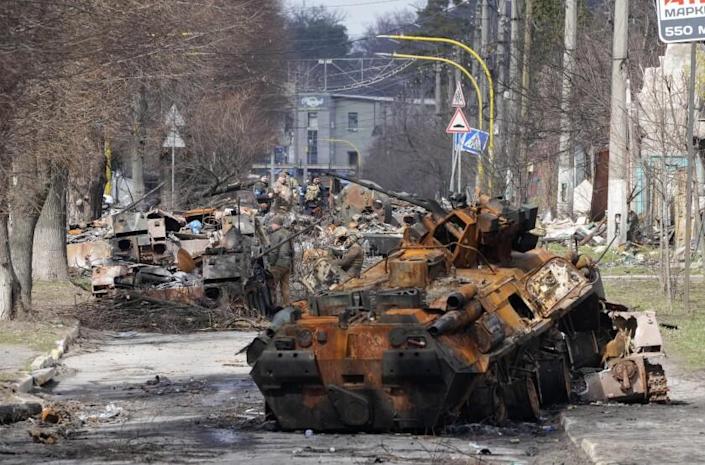
The war crimes committed by Russian forces at Bucha in Ukraine have brought greater clarity to economic sanctions. What is in place now is insufficient and needs to be expanded. There is a strong case for a comprehensive European oil and gas embargo, but this does not appear imminent. The next stages seem likely to play out on three other fronts.
First, the German government will have to act eventually, though this could be very slow and thousands of people are likely to die waiting. Second, the Putin regime and its allies need to be forced to pay compensation to its Ukrainian victims. Third, private rights of action against Putin’s allies, begun now, could help provide at least some measure of justice.
Regarding the atrocities at Bucha, the evidence is compelling that this violence was committed by Russian soldiers who were under the control of their commander. There are satellite photos that show when the deaths occurred, as well as eyewitness accounts and plenty of other evidence. There is little doubt that there will be a war crimes legal process, which President Biden and other world leaders are demanding. And it’s likely that those in the chain of command — including Vladimir Putin — will be found guilty.
Yet despite this knowledge, and fully aware that their payments for Russian oil and gas allow Putin to reequip his army, the Germans and most other European Union countries have reacted only with inadequate soft measures.
Some Gazprom assets in Germany have been temporarily seized, and there may be an embargo against Russian coal. German leaders, however, fear that their economy would be hard-pressed to withstand a sudden cutoff of Russian gas supplies, but leading European economists suggest the effect on Germany’s GDP would be small.
The problem is, the Germans are still unwilling to make limited sacrifices in the face of this crisis. For instance, they cannot even agree to set a speed limit on the autobahn. That would lower gasoline and diesel consumption, and put less money directly into Putin’s pocket. Even a government with a Green Party minister in charge of the economy and energy (Robert Habeck) cannot get this done. The result is inexcusable delay, and a great moral and political failure by one of the most powerful economies of the world.
Another approach is to make Russia pay for the atrocities it has committed in Ukraine, now made brutally clear by the devastation in Bucha. Ordinarily, war criminals are not so careless as to leave large amounts of assets in foreign jurisdictions where they can be seized. But Russia is a large energy exporter, and it has run significant current account surpluses for at least two decades. Consequently, Russia’s total foreign assets amounted to $1.62 trillion in September 2021 and are now reckoned to be closer to $1.7 trillion.
These foreign assets can be seized legally through cases brought by victims of Russian violence. No one forced Russia to sell oil to the world, or to buy real estate in London or New York with the proceeds. When Putin’s cronies adhered close enough to the rules and norms of the global economy, the legal system in various countries protected their property rights. But war crimes and just demands for compensation change everything. Now all foreign assets earned through supporting Putin’s regime are potentially open to being seized and shared among Ukrainians who have suffered enormous losses.
In private discussions in London this week, leading financiers noted that about a trillion British pounds ($1.3 trillion) in assets could be in play.
Given the unwillingness of Western governments to act with greater force against Putin, private lawsuits seeking compensation could be a productive path. It is possible for legal teams to dig deep into offshore jurisdictions to trace transactions through secretive accounts.
With support for Ukraine so high, governments and private sector sources are more likely to share information, making it harder for Putin and his people to hide significant holdings as they have in the past.
Ideally, these legal teams will not stop at pursuing assets (houses, yachts, stocks, bonds, etc.) but will also turn their attention to two kinds of operating businesses.
The first is Russian owned. For example, Sovcomflot owns 133 tankers that transport crude oil and petroleum products around the world. On paper, the value of that fleet is likely between $5 billion and $10 billion. If these ships are impounded or “attached” when they reach a port while carrying Russian-owned oil, the potential value would be much larger, since tankers carry cargo worth hundreds of millions of dollars.
This approach also raises the prospect of an even larger target. Most Russian oil is carried by Western-owned tanker companies, typically chartered by other Western companies. All details of these transactions are either in the public domain or discoverable through a legal process.
Some of these companies claim to be operating under long-term contracts, but based on the data from TankerTrackers.com, it is possible to identify companies that are now handling significantly more Russian oil than they did before the invasion of Ukraine. If a Western tanker company or trader buys Russian oil after Bucha, their actions are directly helping to finance Putin and his war crimes and they should be held accountable financially.
The European businesses may wish to ignore what’s happening in Ukraine and the judgment of history for their failure to respond. But their calculations may well change once courts order their assets, including tanker ships and cargo, to be impounded.
Simon Johnson is a professor at MIT Sloan and former chief economist at the International Monetary Fund. He is an unpaid advisor to BloodOil.today.
This story originally appeared in Los Angeles Times.




